C语言头文件使用大全
- 格式:doc
- 大小:40.50 KB
- 文档页数:11


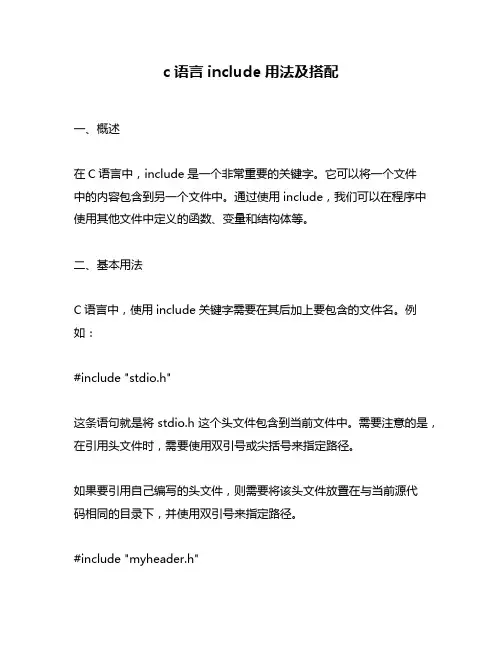
c语言include用法及搭配一、概述在C语言中,include是一个非常重要的关键字。
它可以将一个文件中的内容包含到另一个文件中。
通过使用include,我们可以在程序中使用其他文件中定义的函数、变量和结构体等。
二、基本用法C语言中,使用include关键字需要在其后加上要包含的文件名。
例如:#include "stdio.h"这条语句就是将stdio.h这个头文件包含到当前文件中。
需要注意的是,在引用头文件时,需要使用双引号或尖括号来指定路径。
如果要引用自己编写的头文件,则需要将该头文件放置在与当前源代码相同的目录下,并使用双引号来指定路径。
#include "myheader.h"三、搭配其他关键字1. #ifndef和#define为了避免重复引用同一个头文件,我们通常会在头文件中加入以下代码:#ifndef MYHEADER_H#define MYHEADER_H// 头文件内容#endif这里的MYHEADER_H可以替换成任何你想要的标识符。
当第一次引用该头文件时,MYHEADER_H还没有被定义,因此#ifndef后面的代码会被执行;当第二次及以后再次引用该头文件时,因为MYHEADER_H已经被定义过了,所以#ifndef后面的代码不会被执行。
2. #pragma once除了使用#ifndef和#define之外,还可以使用#pragma once来避免重复引用。
该关键字可以在头文件中的最开始处使用,例如:#pragma once// 头文件内容与#ifndef和#define的作用相同,都是避免同一个头文件被重复引用。
3. #ifdef和#endif在程序中,我们可能会根据不同的条件来选择性地包含某些头文件。
这时可以使用#ifdef和#endif来实现。
例如,下面的代码表示如果宏定义DEBUG被定义了,则包含debug.h头文件:#ifdef DEBUG#include "debug.h"#endif四、常见头文件C语言中有很多常见的头文件,下面列举几个常用的:1. stdio.h:标准输入输出库,包含了很多输入输出函数。

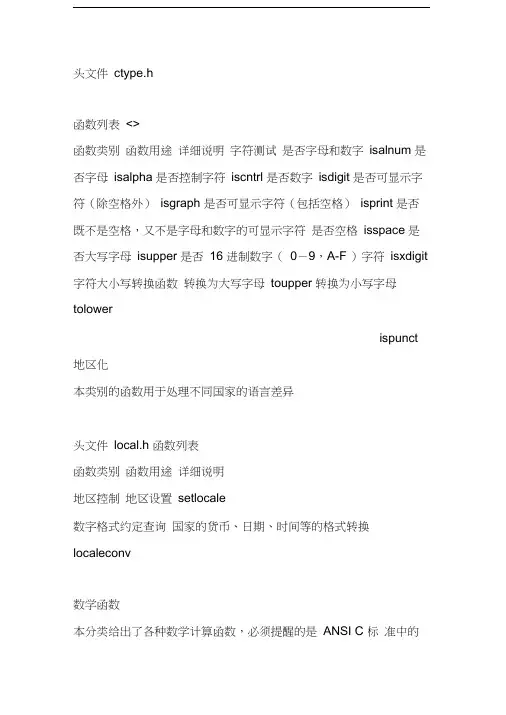
头文件ctype.h函数列表<>函数类别函数用途详细说明字符测试是否字母和数字isalnum 是否字母isalpha 是否控制字符iscntrl 是否数字isdigit 是否可显示字符(除空格外)isgraph 是否可显示字符(包括空格)isprint 是否既不是空格,又不是字母和数字的可显示字符是否空格isspace 是否大写字母isupper 是否16 进制数字(0-9,A-F )字符isxdigit 字符大小写转换函数转换为大写字母toupper 转换为小写字母tolowerispunct 地区化本类别的函数用于处理不同国家的语言差异头文件local.h 函数列表函数类别函数用途详细说明地区控制地区设置setlocale数字格式约定查询国家的货币、日期、时间等的格式转换localeconv数学函数本分类给出了各种数学计算函数,必须提醒的是ANSI C 标准中的数据格式并不符合IEEE754 标准,一些C 语言编译器却遵循IEEE754(例如frinklin C51)头文件math.h函数列表函数类别函数用途详细说明错误条件处理定义域错误(函数的输入参数值不在规定的范围内)值域错误(函数的返回值不在规定的范围内)三角函数反余弦acos反正弦asin 反正切atan反正切2 atan2余弦cos 正弦sin 正切tan 双曲函数双曲余弦cosh 双曲正弦sinh 双曲正切tanh 指数和对数指数函数exp 指数分解函数frexp 乘积指数函数fdexp 自然对数log 以10 为底的对数log10 浮点数分解函数modf 幂函数幂函数pow 平方根函数sqrt 整数截断,绝对值和求余数函数求下限接近整数绝对值fabs 求上限接近整数floor 求余数fmod本分类函数用于实现在不同底函数之间直接跳转代码文件setjmp.h io.h函数列表函数类别函数用途详细说明保存调用环境setjmpceil恢复调用环境longjmp信号处理该分类函数用于处理那些在程序执行过程中发生例外的情况。
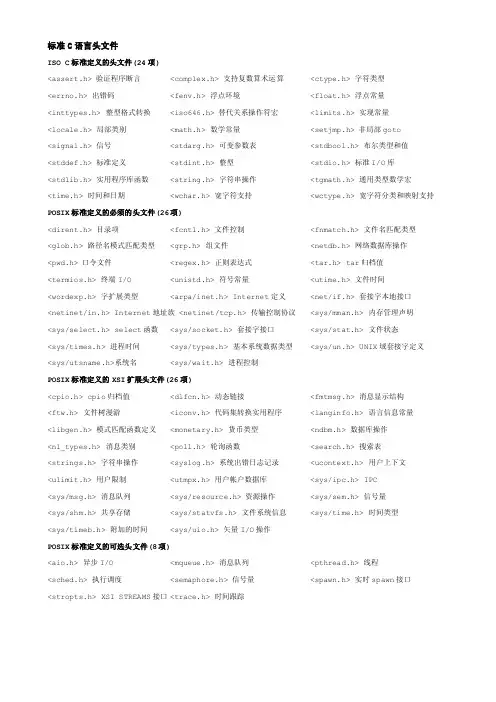
标准C语言头文件ISO C标准定义的头文件(24项)<assert.h> 验证程序断言<complex.h> 支持复数算术运算<ctype.h> 字符类型<errno.h> 出错码<fenv.h> 浮点环境<float.h> 浮点常量<inttypes.h> 整型格式转换<iso646.h> 替代关系操作符宏<limits.h> 实现常量<locale.h> 局部类别<math.h> 数学常量<setjmp.h> 非局部goto<signal.h> 信号<stdarg.h> 可变参数表<stdbool.h> 布尔类型和值<stddef.h> 标准定义<stdint.h> 整型<stdio.h> 标准I/O库<stdlib.h> 实用程序库函数<string.h> 字符串操作<tgmath.h> 通用类型数学宏<time.h> 时间和日期<wchar.h> 宽字符支持<wctype.h> 宽字符分类和映射支持POSIX标准定义的必须的头文件(26项)<dirent.h> 目录项<fcntl.h> 文件控制<fnmatch.h> 文件名匹配类型<glob.h> 路径名模式匹配类型<grp.h> 组文件<netdb.h> 网络数据库操作<pwd.h> 口令文件<regex.h> 正则表达式<tar.h> tar归档值<termios.h> 终端I/O <unistd.h> 符号常量<utime.h> 文件时间<wordexp.h> 字扩展类型<arpa/inet.h> Internet定义<net/if.h> 套接字本地接口<netinet/in.h> Internet地址族 <netinet/tcp.h> 传输控制协议<sys/mman.h> 内存管理声明<sys/select.h> select函数<sys/socket.h> 套接字接口<sys/stat.h> 文件状态<sys/times.h> 进程时间<sys/types.h> 基本系统数据类型<sys/un.h> UNIX域套接字定义<sys/utsname.h>系统名<sys/wait.h> 进程控制POSIX标准定义的XSI扩展头文件(26项)<cpio.h> cpio归档值<dlfcn.h> 动态链接<fmtmsg.h> 消息显示结构<ftw.h> 文件树漫游<iconv.h> 代码集转换实用程序<langinfo.h> 语言信息常量<libgen.h> 模式匹配函数定义<monetary.h> 货币类型<ndbm.h> 数据库操作<nl_types.h> 消息类别<poll.h> 轮询函数<search.h> 搜索表<strings.h> 字符串操作<syslog.h> 系统出错日志记录<ucontext.h> 用户上下文<ulimit.h> 用户限制<utmpx.h> 用户帐户数据库<sys/ipc.h> IPC<sys/msg.h> 消息队列<sys/resource.h> 资源操作<sys/sem.h> 信号量<sys/shm.h> 共享存储<sys/statvfs.h> 文件系统信息<sys/time.h> 时间类型<sys/timeb.h> 附加的时间<sys/uio.h> 矢量I/O操作POSIX标准定义的可选头文件(8项)<aio.h> 异步I/O <mqueue.h> 消息队列<pthread.h> 线程<sched.h> 执行调度<semaphore.h> 信号量<spawn.h> 实时spawn接口<stropts.h> XSI STREAMS接口<trace.h> 时间跟踪标准 C++ 语言头文件(54个其中16个用于构建STL,3个为附加非必须)<algorithm>STL通用算法<bitset> STL位集容器<cassert> 用于在程序运行时执行断言<cctype> 字符处理<cerrno> 错误码<cfloat> 用于测试浮点类型属性<ciso646> ISO646变体字符集<climits> 测试整数类型属性<clocale> 本地化函数<cmath> 数学函数<complex>复数类<csetjmp> 执行非内部的goto语句<csignal> 信号<cstdarg> 访问参数数量变化的函数<cstddef> 用于定义实用的类型和宏<cstdio> 输入/输出<cstdlib> 杂项函数及内存分配<cstring> 字符串<ctime> 时间<cwchar> 宽字符处理及输入/输出<cwctype> 宽字符分类<deque> STL双端队列容器<exception> 异常处理类<fstream> 文件流<functional> STL函数对象<iomanip> 参数化输入/输出<ios>基本输入/输出支持<iosfwd> 输入/输出前置声明<iostream> 数据流输入/输出<istream> 基本输入流<iterator> 遍历序列的类<limits> 各种数据类型最值常量<list>STL线性列表容器<locale> 国际化支持<map> STL映射容器<memory> 专用内存分配器<new> 基本内存分配和释放<numeric> 通用的数字操作<ostream> 基本输出流<queue> STL 队列容器<set> STL 集合容器<sstream> 基于字符串的流<stack> STL 堆栈容器<stdexcept> 标准异常类<streambuf> iostream 的缓冲区类<string> 字符串类<strstream> 非内存字符序列的流类<typeinfo> 运行时类型标识<utility> STL 通用模板类<valarray> 支持值数组的类和模版类<vector> STL 动态数组容器标准C++附加的头文件(3个)非必须<hash_map> <hash_set> <slist>The Standard C++ library consists of 51 required headers.This implementation also includesthree additional headers,<hash_map>,<hash_set>,and <slist>,not required by the C++ Standard,for a total of 54 headers.Of these 54 headers,16 constitute the Standard Template Library,or STL.These are indicated below with the notation<algorithm> -- (STL) for defining numerous templates that implement useful algorithms<bitset> -- for defining a template class that administers sets of bits<complex> -- for defining a template class that supports complex arithmetic<deque> -- (STL) for defining a template class that implements a deque container<exception> -- for defining several functions that control exception handling<fstream> -- for defining several iostreams template classes that manipulate exteral files<functional>-- (STL) for defining several templates that help construct predicates for the templates defined in <algorithm> and <numeric><hash_map> -- (STL) for defining template classes that implement hashed associative containersthat map keys to values<hash_set> -- (STL) for defining template classes that implement hashed associative containers<iomanip> -- for declaring several iostreams manipulators that take an argument<ios> -- for defining the template class that serves as the base for many iostreams classes<iosfwd> -- for declaring several iostreams template classes before they are necessarilydefined<iostream> -- for declaring the iostreams objects that manipulate the standard streams<istream> -- for defining the template class that performs extractions<iterator> -- (STL) for defining several templates that help define and manipulate iterators<limits> -- for testing numeric type properties<list>-- (STL) for defining a template class that implements a doubly linked list container<locale> -- for defining several classes and templates that controllocale-specific behavior, as in the iostreams classes<map>-- (STL) for defining template classes that implement associative containers thatmap keys to values<memory>-- (STL) for defining several templates that allocate and free storage for variouscontainer classes<new> -- for declaring several functions that allocate and free storage<numeric>-- (STL) for defining several templates that implement useful numeric functions<ostream> -- for defining the template class that performs insertions<queue> -- (STL) for defining a template class that implements a queue container<set>-- (STL) for defining template classes that implement associative containers<slist>-- (STL) for defining a template class that implements a singly linked list container<sstream> -- for defining several iostreams template classes that manipulate string containers<stack> -- (STL) for defining a template class that implements a stack container<stdexcept> -- for defining several classes useful for reporting exceptions<streambuf> -- for defining template classes that buffer iostreams operations<string> -- for defining a template class that implements a string container<strstream> -- for defining several iostreams classes that manipulate in-memory character sequences<typeinfo> -- for defining class type_info, the result of the typeid operator<utility>-- (STL) for defining several templates of general utility<vector>-- (STL) for defining a template class that implements a vector container新的C标准库<cassert> -- for enforcing assertions when functions execute<cctype> -- for classifying characters<cerrno> -- for testing error codes reported by library functions<cfloat> -- for testing floating-point type properties<ciso646> -- for programming in ISO 646 variant character sets<climits> -- for testing integer type properties<clocale> -- for adapting to different cultural conventions<cmath> -- for computing common mathematical functions<csetjmp> -- for executing nonlocal goto statements<csignal> -- for controlling various exceptional conditions<cstdarg> -- for accessing a varying number of arguments<cstddef> -- for defining several useful types and macros<cstdio> -- for performing input and output<cstdlib> -- for performing a variety of operations<cstring> -- for manipulating several kinds of strings<ctime> -- for converting between various time and date formats<cwchar> -- for manipulating wide streams and several kinds of strings<cwctype> -- for classifying wide characters旧的C标准库<assert.h> -- for enforcing assertions when functions execute<ctype.h> -- for classifying characters<errno.h> -- for testing error codes reported by library functions<float.h> -- for testing floating-point type properties<iso646.h> -- for programming in ISO 646 variant character sets<limits.h> -- for testing integer type properties<locale.h> -- for adapting to different cultural conventions<math.h> -- for computing common mathematical functions<setjmp.h> -- for executing nonlocal goto statements<signal.h> -- for controlling various exceptional conditions<stdarg.h> -- for accessing a varying number of arguments<stddef.h> -- for defining several useful types and macros<stdio.h> -- for performing input and output<stdlib.h> -- for performing a variety of operations<string.h> -- for manipulating several kinds of strings<time.h> -- for converting between various time and date formats<wchar.h> -- for manipulating wide streams and several kinds of strings<wctype.h> -- for classifying wide charactersFinally, in this implementation, the Standard C++ library also includes several headers for compatibility with traditional C++ libraries:<fstream.h> -- for defining several iostreams template classes that manipulate exteral files <iomanip.h> -- for declaring several iostreams manipulators that take an argument<iostream.h> -- for declaring the iostreams objects that manipulate the standard streams <new.h> -- for declaring several functions that allocate and free storage财务部工作总结、分析及计划报告范文[财务部工作总结、分析及计划报告范文]务部工作总结、分析及计划报告范文2009-12-10 10:25读者上传【大中小】【打印】【我要纠错】在上级财务部门的业务指导下,以年初支公司提出的工作思路为指导,以提高企业效益为核心,以增强企业综合竞争力为目标,以成本治理和资金治理为重点,全面落实预算治理,强基础,抓规范,实现了全年业务制度规范化,经营治理科学化,企业效益最大化,有力地推动了支公司财务治理水平的进一步提高,充分发挥了财务治理在企业治理中的核心作用,财务部工作总结、分析及计划报告范文。
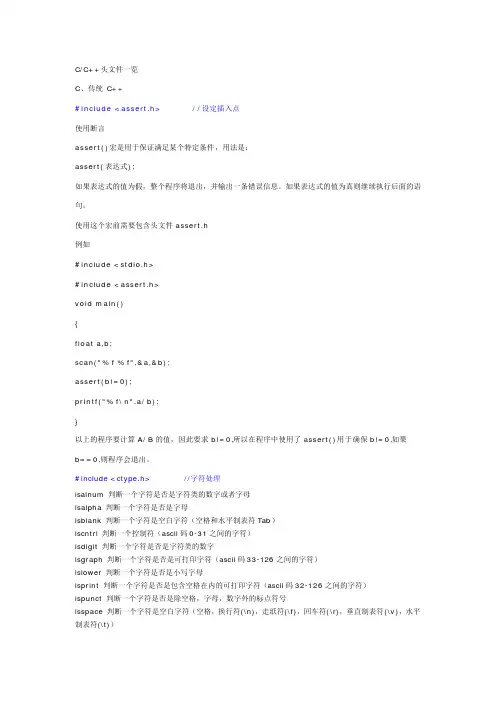

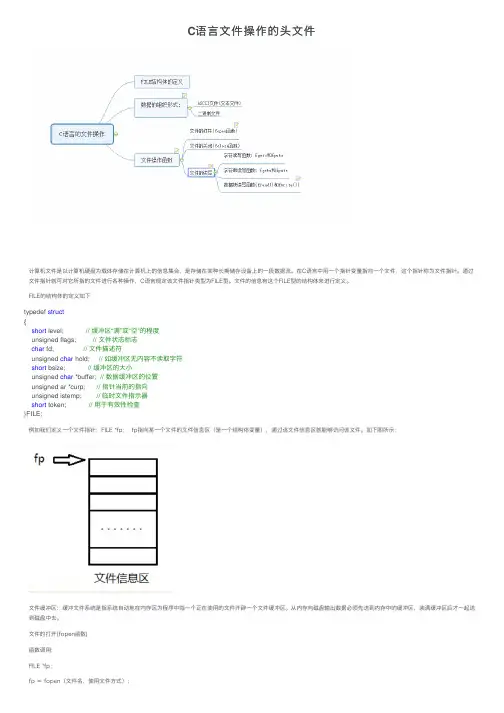
C语⾔⽂件操作的头⽂件计算机⽂件是以计算机硬盘为载体存储在计算机上的信息集合,是存储在某种长期储存设备上的⼀段数据流。
在C语⾔中⽤⼀个指针变量指向⼀个⽂件,这个指针称为⽂件指针。
通过⽂件指针就可对它所指的⽂件进⾏各种操作,C语⾔规定该⽂件指针类型为FILE型。
⽂件的信息有这个FILE型的结构体来进⾏定义。
FILE的结构体的定义如下例如我们定义⼀个⽂件指针:FILE *fp; fp指向某⼀个⽂件的⽂件信息区(是⼀个结构体变量),通过该⽂件信息区就能够访问该⽂件。
如下图所⽰:⽂件缓冲区:缓冲⽂件系统是指系统⾃动地在内存区为程序中每⼀个正在使⽤的⽂件开辟⼀个⽂件缓冲区。
从内存向磁盘输出数据必须先送到内存中的缓冲区,装满缓冲区后才⼀起送到磁盘中去。
⽂件的打开(fopen函数)函数调⽤:FILE *fp;fp = fopen(⽂件名,使⽤⽂件⽅式);typedef struct{short level; // 缓冲区“满”或“空”的程度unsigned flags; // ⽂件状态标志char fd; // ⽂件描述符unsigned char hold; // 如缓冲区⽆内容不读取字符short bsize; // 缓冲区的⼤⼩unsigned char *buffer; // 数据缓冲区的位置unsigned ar *curp; // 指针当前的指向unsigned istemp; // 临时⽂件指⽰器short token; // ⽤于有效性检查}FILE;注意:需要打开的⽂件名,也就是准备访问的⽂件的名字使⽤⽂件的⽅式(“读”还是“写”等);让哪⼀个指针变量指向被打开的⽂件。
⽂件使⽤⽅式 含 义-------------------------------------------------------------------------------------“r” (只读)为输⼊打开⼀个⽂本⽂件“w” (只写)为输出打开⼀个⽂本⽂件“a” (追加)向⽂本⽂件尾增加数据(以ascll码的形式追加)“rb” (只读)为输⼊打开⼀个⼆进制⽂件“wb” (只写)为输出打开⼀个⼆进制⽂件"ab“ (追加)向⼆进制⽂件尾增加数据(以⼆进制的形式追加)"r+“ (读写)为读/写打开⼀个⽂本⽂件"w+” (读写)为读/写建⽴⼀个新的⽂本⽂件"a+” (读写)为读/写打开⼀个⽂本⽂件"rb+“ (读写)为读/写打开⼀个⼆进制⽂件“wb+“ (读写)为读/写建⽴⼀个新的⼆进制⽂件“ab+” (读写)为读/写打开⼀个⼆进制⽂件-------------------------------------------------------------------------------------⼏点注意:凡⽤“r”打开⼀个⽂件时,该⽂件必须已经存在,且只能从该⽂件读出。
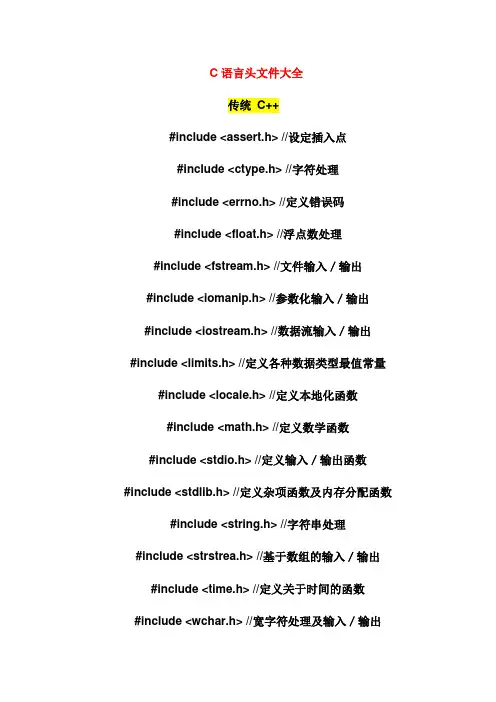
C语言头文件大全传统C++#include <assert.h> //设定插入点#include <ctype.h> //字符处理#include <errno.h> //定义错误码#include <float.h> //浮点数处理#include <fstream.h> //文件输入/输出#include <iomanip.h> //参数化输入/输出#include <iostream.h> //数据流输入/输出#include <limits.h> //定义各种数据类型最值常量#include <locale.h> //定义本地化函数#include <math.h> //定义数学函数#include <stdio.h> //定义输入/输出函数#include <stdlib.h> //定义杂项函数及内存分配函数#include <string.h> //字符串处理#include <strstrea.h> //基于数组的输入/输出#include <time.h> //定义关于时间的函数#include <wchar.h> //宽字符处理及输入/输出#include <wctype.h> //宽字符分类标准C++ (同上的不再注释)#include <algorithm> //STL 通用算法#include <bitset> //STL 位集容器#include <cctype>#include <cerrno>#include <clocale>#include <cmath>#include <complex> //复数类#include <cstdio>#include <cstdlib>#include <cstring>#include <ctime>#include <deque> //STL 双端队列容器#include <exception> //异常处理类#include <fstream>#include <functional> //STL 定义运算函数(代替运算符)#include <limits>#include <list> //STL 线性列表容器#include <map> //STL 映射容器#include <iomanip>#include <ios> //基本输入/输出支持#include <iosfwd> //输入/输出系统使用的前置声明#include <iostream>#include <istream> //基本输入流#include <ostream> //基本输出流#include <queue> //STL 队列容器#include <set> //STL 集合容器#include <sstream> //基于字符串的流#include <stack> //STL 堆栈容器#include <stdexcept> //标准异常类#include <streambuf> //底层输入/输出支持#include <string> //字符串类#include <utility> //STL 通用模板类#include <vector> //STL 动态数组容器#include <cwchar>#include <cwctype>using namespace std;C99 增加#include <complex.h> //复数处理#include <fenv.h> //浮点环境#include <inttypes.h> //整数格式转换#include <stdbool.h> //布尔环境#include <stdint.h> //整型环境#include <tgmath.h> //通用类型数学宏。
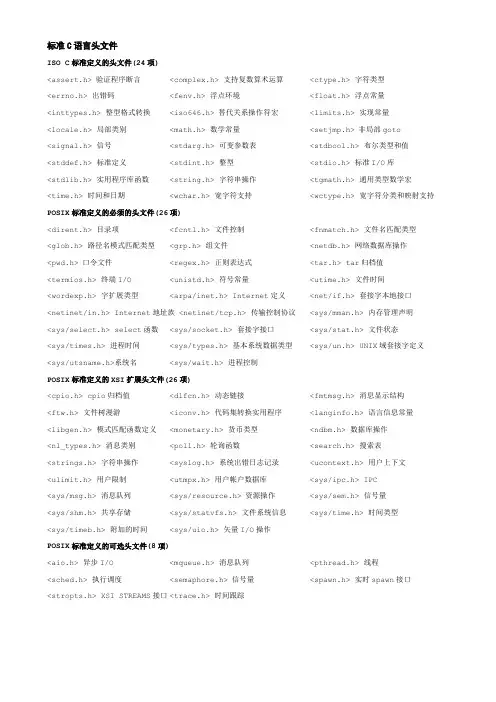
标准C语言头文件ISO C标准定义的头文件(24项)<assert.h> 验证程序断言<complex.h> 支持复数算术运算<ctype.h> 字符类型<errno.h> 出错码<fenv.h> 浮点环境<float.h> 浮点常量<inttypes.h> 整型格式转换<iso646.h> 替代关系操作符宏<limits.h> 实现常量<locale.h> 局部类别<math.h> 数学常量<setjmp.h> 非局部goto<signal.h> 信号<stdarg.h> 可变参数表<stdbool.h> 布尔类型和值<stddef.h> 标准定义<stdint.h> 整型<stdio.h> 标准I/O库<stdlib.h> 实用程序库函数<string.h> 字符串操作<tgmath.h> 通用类型数学宏<time.h> 时间和日期<wchar.h> 宽字符支持<wctype.h> 宽字符分类和映射支持POSIX标准定义的必须的头文件(26项)<dirent.h> 目录项<fcntl.h> 文件控制<fnmatch.h> 文件名匹配类型<glob.h> 路径名模式匹配类型<grp.h> 组文件<netdb.h> 网络数据库操作<pwd.h> 口令文件<regex.h> 正则表达式<tar.h> tar归档值<termios.h> 终端I/O <unistd.h> 符号常量<utime.h> 文件时间<wordexp.h> 字扩展类型<arpa/inet.h> Internet定义<net/if.h> 套接字本地接口<netinet/in.h> Internet地址族 <netinet/tcp.h> 传输控制协议<sys/mman.h> 内存管理声明<sys/select.h> select函数<sys/socket.h> 套接字接口<sys/stat.h> 文件状态<sys/times.h> 进程时间<sys/types.h> 基本系统数据类型<sys/un.h> UNIX域套接字定义<sys/utsname.h>系统名<sys/wait.h> 进程控制POSIX标准定义的XSI扩展头文件(26项)<cpio.h> cpio归档值<dlfcn.h> 动态链接<fmtmsg.h> 消息显示结构<ftw.h> 文件树漫游<iconv.h> 代码集转换实用程序<langinfo.h> 语言信息常量<libgen.h> 模式匹配函数定义<monetary.h> 货币类型<ndbm.h> 数据库操作<nl_types.h> 消息类别<poll.h> 轮询函数<search.h> 搜索表<strings.h> 字符串操作<syslog.h> 系统出错日志记录<ucontext.h> 用户上下文<ulimit.h> 用户限制<utmpx.h> 用户帐户数据库<sys/ipc.h> IPC<sys/msg.h> 消息队列<sys/resource.h> 资源操作<sys/sem.h> 信号量<sys/shm.h> 共享存储<sys/statvfs.h> 文件系统信息<sys/time.h> 时间类型<sys/timeb.h> 附加的时间<sys/uio.h> 矢量I/O操作POSIX标准定义的可选头文件(8项)<aio.h> 异步I/O <mqueue.h> 消息队列<pthread.h> 线程<sched.h> 执行调度<semaphore.h> 信号量<spawn.h> 实时spawn接口<stropts.h> XSI STREAMS接口<trace.h> 时间跟踪标准 C++ 语言头文件(54个其中16个用于构建STL,3个为附加非必须)<algorithm>STL通用算法<bitset> STL位集容器<cassert> 用于在程序运行时执行断言<cctype> 字符处理<cerrno> 错误码<cfloat> 用于测试浮点类型属性<ciso646> ISO646变体字符集<climits> 测试整数类型属性<clocale> 本地化函数<cmath> 数学函数<complex>复数类<csetjmp> 执行非内部的goto语句<csignal> 信号<cstdarg> 访问参数数量变化的函数<cstddef> 用于定义实用的类型和宏<cstdio> 输入/输出<cstdlib> 杂项函数及内存分配<cstring> 字符串<ctime> 时间<cwchar> 宽字符处理及输入/输出<cwctype> 宽字符分类<deque> STL双端队列容器<exception> 异常处理类<fstream> 文件流<functional> STL函数对象<iomanip> 参数化输入/输出<ios>基本输入/输出支持<iosfwd> 输入/输出前置声明<iostream> 数据流输入/输出<istream> 基本输入流<iterator> 遍历序列的类<limits> 各种数据类型最值常量<list>STL线性列表容器<locale> 国际化支持<map> STL映射容器<memory> 专用内存分配器<new> 基本内存分配和释放<numeric> 通用的数字操作<ostream> 基本输出流<queue> STL 队列容器<set> STL 集合容器<sstream> 基于字符串的流<stack> STL 堆栈容器<stdexcept> 标准异常类<streambuf> iostream 的缓冲区类<string> 字符串类<strstream> 非内存字符序列的流类<typeinfo> 运行时类型标识<utility> STL 通用模板类<valarray> 支持值数组的类和模版类<vector> STL 动态数组容器标准C++附加的头文件(3个)非必须<hash_map> <hash_set> <slist>The Standard C++ library consists of 51 required headers.This implementation also includes three additional headers,<hash_map>,<hash_set>,and <slist>,not required by the C++ Standard,for a total of 54 headers.Of these 54 headers,16 constitute the Standard Template Library,or STL.These are indicated below with the notation<algorithm> -- (STL) for defining numerous templates that implement useful algorithms<bitset> -- for defining a template class that administers sets of bits<complex> -- for defining a template class that supports complex arithmetic<deque> -- (STL) for defining a template class that implements a deque container<exception> -- for defining several functions that control exception handling<fstream> -- for defining several iostreams template classes that manipulate exteral files<functional>-- (STL) for defining several templates that help construct predicates for the templates defined in <algorithm> and <numeric><hash_map> -- (STL) for defining template classes that implement hashed associative containersthat map keys to values<hash_set> -- (STL) for defining template classes that implement hashed associative containers<iomanip> -- for declaring several iostreams manipulators that take an argument<ios> -- for defining the template class that serves as the base for many iostreams classes<iosfwd> -- for declaring several iostreams template classes before they are necessarilydefined<iostream> -- for declaring the iostreams objects that manipulate the standard streams<istream> -- for defining the template class that performs extractions<iterator> -- (STL) for defining several templates that help define and manipulate iterators<limits> -- for testing numeric type properties<list>-- (STL) for defining a template class that implements a doubly linked list container<locale> -- for defining several classes and templates that controllocale-specific behavior, as in the iostreams classes<map>-- (STL) for defining template classes that implement associative containers thatmap keys to values<memory>-- (STL) for defining several templates that allocate and free storage for variouscontainer classes<new> -- for declaring several functions that allocate and free storage<numeric>-- (STL) for defining several templates that implement useful numeric functions<ostream> -- for defining the template class that performs insertions<queue> -- (STL) for defining a template class that implements a queue container<set>-- (STL) for defining template classes that implement associative containers<slist>-- (STL) for defining a template class that implements a singly linked list container<sstream> -- for defining several iostreams template classes that manipulate string containers<stack> -- (STL) for defining a template class that implements a stack container<stdexcept> -- for defining several classes useful for reporting exceptions<streambuf> -- for defining template classes that buffer iostreams operations<string> -- for defining a template class that implements a string container<strstream> -- for defining several iostreams classes that manipulate in-memory character sequences<typeinfo> -- for defining class type_info, the result of the typeid operator<utility>-- (STL) for defining several templates of general utility<valarray> -- for defining several classes and template classes that support value-oriented arrays<vector>-- (STL) for defining a template class that implements a vector container新的C标准库<cassert> -- for enforcing assertions when functions execute<cctype> -- for classifying characters<cerrno> -- for testing error codes reported by library functions<cfloat> -- for testing floating-point type properties<ciso646> -- for programming in ISO 646 variant character sets<climits> -- for testing integer type properties<clocale> -- for adapting to different cultural conventions<cmath> -- for computing common mathematical functions<csetjmp> -- for executing nonlocal goto statements<csignal> -- for controlling various exceptional conditions<cstdarg> -- for accessing a varying number of arguments<cstddef> -- for defining several useful types and macros<cstdio> -- for performing input and output<cstdlib> -- for performing a variety of operations<cstring> -- for manipulating several kinds of strings<ctime> -- for converting between various time and date formats<cwchar> -- for manipulating wide streams and several kinds of strings<cwctype> -- for classifying wide characters旧的C标准库<assert.h> -- for enforcing assertions when functions execute<ctype.h> -- for classifying characters<errno.h> -- for testing error codes reported by library functions<float.h> -- for testing floating-point type properties<iso646.h> -- for programming in ISO 646 variant character sets<limits.h> -- for testing integer type properties<locale.h> -- for adapting to different cultural conventions<math.h> -- for computing common mathematical functions<setjmp.h> -- for executing nonlocal goto statements<signal.h> -- for controlling various exceptional conditions<stdarg.h> -- for accessing a varying number of arguments<stddef.h> -- for defining several useful types and macros<stdio.h> -- for performing input and output<stdlib.h> -- for performing a variety of operations<string.h> -- for manipulating several kinds of strings<time.h> -- for converting between various time and date formats<wchar.h> -- for manipulating wide streams and several kinds of strings<wctype.h> -- for classifying wide charactersFinally, in this implementation, the Standard C++ library also includes several headers for compatibility with traditional C++ libraries:<fstream.h> -- for defining several iostreams template classes that manipulate exteral files <iomanip.h> -- for declaring several iostreams manipulators that take an argument<iostream.h> -- for declaring the iostreams objects that manipulate the standard streams <new.h> -- for declaring several functions that allocate and free storage<stl.h> -- for declaring several template classes that aid migration from older versions of the Standard Template Library。
C语言所有常用头文件用途C语言的头文件是预编译的指令,用来导入函数和变量的声明,以及宏定义等。
常用头文件涵盖了各种操作和功能,大致可以分为系统头文件、标准库头文件和用户自定义头文件等几大类。
下面是一些常用的C语言头文件及其用途的简要介绍。
1. stdio.h:提供输入输出函数。
包括 printf(、scanf(、getchar(、putchar(等函数,用于屏幕输入输出。
2. stdlib.h:提供一些常用的函数和宏,如 memory allocation functions(malloc(、calloc(、realloc()和 exit( 函数等。
3. string.h:提供字符串处理函数。
包括 strcpy(、strcat(、strlen( 和 strcmp(等函数,用于处理字符串相关操作。
4. math.h:提供数学运算函数。
包括 abs(、sqrt(、sin(、cos(、tan(等函数,用于执行数学计算和操作。
6. ctype.h:提供字符处理函数。
例如 isalpha(、isdigit( 和tolower(等函数,用于字符类型判断和转换。
7. assert.h:宏定义用于程序运行时的断言。
例如 assert( 宏,用于在程序运行时检查条件是否满足,如不满足则终止程序。
8. stdarg.h:提供可变参数函数的定义和使用。
包括 va_start(、va_arg( 和 va_end(等宏和函数,用于操作可变参数列表。
9. float.h:提供浮点数相关信息和宏定义。
例如 FLT_MAX、DBL_MAX 和 LDBL_MAX等常量,表示浮点数的最大值。
10. limits.h:提供整数类型的取值范围和宏定义。
例如 INT_MAX、INT_MIN 和 CHAR_BIT等常量,表示整数类型的最大值、最小值和字符位数。
11. stdbool.h:提供布尔类型的定义和宏定义。
包括 bool、true 和 false等常量,表示布尔类型的值。
C语言头文件大全修订版IBMT standardization office【IBMT5AB-IBMT08-IBMT2C-ZZT18】标准C语言头文件ISO C标准定义的头文件(24项)<assert.h> 验证程序断言<complex.h>?支持复数算术运算<ctype.h>?字符类型<errno.h>?出错码<fenv.h>?浮点环境<float.h>?浮点常量<inttypes.h>?整型格式转换<iso646.h> 替代关系操作符宏<limits.h>?实现常量<locale.h>?局部类别<math.h>?数学常量<setjmp.h> 非局部goto<signal.h>?信号<stdarg.h>?可变参数表<stdbool.h>?布尔类型和值<stddef.h>?标准定义<stdint.h>?整型<stdio.h>?标准I/O库<stdlib.h>?实用程序库函数<string.h>?字符串操作<tgmath.h>?通用类型数学宏<time.h>?时间和日期<wchar.h>?宽字符支持<wctype.h>?宽字符分类和映射支持POSIX标准定义的必须的头文件(26项)<dirent.h>?目录项<fcntl.h>?文件控制<fnmatch.h>?文件名匹配类型<glob.h>?路径名模式匹配类型<grp.h>?组文件<netdb.h>?网络数据库操作<pwd.h> 口令文件<regex.h>?正则表达式<tar.h>?tar归档值<termios.h>?终端I/O <unistd.h>?符号常量<utime.h>?文件时间<wordexp.h>?字扩展类型<arpa/inet.h>?Internet定义<net/if.h>?套接字本地接口<netinet/in.h> Internet地址族 <netinet/tcp.h>?传输控制协议<sys/mman.h>?内存管理声明<sys/select.h>?select函数<sys/socket.h>?套接字接口<sys/stat.h>?文件状态<sys/times.h>?进程时间<sys/types.h>?基本系统数据类型<sys/un.h>?UNIX域套接字定义<sys/utsname.h>系统名<sys/wait.h>?进程控制POSIX标准定义的XSI扩展头文件(26项)<cpio.h> cpio归档值<dlfcn.h>?动态链接<fmtmsg.h>?消息显示结构<ftw.h>?文件树漫游<iconv.h>?代码集转换实用程序<langinfo.h>?语言信息常量<libgen.h>?模式匹配函数定义<monetary.h>?货币类型<ndbm.h>?数据库操作<nl_types.h>?消息类别<poll.h>?轮询函数<search.h>?搜索表<strings.h>?字符串操作<syslog.h>?系统出错日志记录<ucontext.h>?用户上下文<ulimit.h>?用户限制<utmpx.h>?用户帐户数据库<sys/ipc.h> IPC<sys/msg.h>?消息队列<sys/resource.h> 资源操作<sys/sem.h>?信号量<sys/shm.h>?共享存储<sys/statvfs.h>?文件系统信息<sys/time.h>?时间类型<sys/timeb.h>?附加的时间<sys/uio.h>?矢量I/O操作POSIX标准定义的可选头文件(8项)<aio.h>?异步I/O <mqueue.h>?消息队列<pthread.h>?线程<sched.h>?执行调度<semaphore.h> 信号量<spawn.h>?实时spawn接口<stropts.h>?XSI STREAMS接口<trace.h>?时间跟踪标准 C++ 语言头文件(54个其中16个用于构建STL,3个为附加非必须)<algorithm> STL通用算法<bitset> STL位集容器<cassert>?用于在程序运行时执行断言<cctype> 字符处理<cerrno> 错误码<cfloat>?用于测试浮点类型属性<ciso646>?ISO646变体字符集<climits>?测试整数类型属性<clocale> 本地化函数<cmath> 数学函数<complex> 复数类<csetjmp>?执行非内部的goto语句<csignal>?信号<cstdarg>?访问参数数量变化的函数<cstddef>?用于定义实用的类型和宏<cstdio> 输入/输出<cstdlib> 杂项函数及内存分配<cstring> 字符串<ctime> 时间<cwchar> 宽字符处理及输入/输出<cwctype> 宽字符分类<deque> STL双端队列容器<exception> 异常处理类<fstream> 文件流<functional> STL函数对象<iomanip> 参数化输入/输出<ios> 基本输入/输出支持<iosfwd> 输入/输出前置声明<iostream> 数据流输入/输出<istream> 基本输入流<iterator> 遍历序列的类<limits> 各种数据类型最值常量<list> STL 线性列表容器<locale> 国际化支持<map> STL映射容器<memory> 专用内存分配器<new> 基本内存分配和释放? <numeric> 通用的数字操作<ostream> 基本输出流<queue> STL 队列容器<set> STL 集合容器<sstream> 基于字符串的流<stack> STL 堆栈容器<stdexcept> 标准异常类<streambuf> iostream 的缓冲区类<string> 字符串类<strstream>?非内存字符序列的流类<typeinfo> 运行时类型标识<utility> STL 通用模板类<valarray>?支持值数组的类和模版类<vector> STL 动态数组容器标准C++附加的头文件(3个)非必须<hash_map> <hash_set><slist>The Standard C++ library consists of 51 required headers.This implementation also includes three additional headers,<hash_map>,<hash_set>,and <slist>,not required by the C++ Standard, for a total of 54 headers.Of these 54 headers,16 constitute the Standard Template Library, or STL.These are indicated below with the notation<algorithm> -- (STL) for defining numerous templates that implement useful algorithms<bitset> -- for defining a template class that administers sets of bits<complex> -- for defining a template class that supports complex arithmetic <deque> -- (STL) for defining a template class that implements a deque container<exception> -- for defining several functions that control exception handling <fstream> -- for defining several iostreams template classes that manipulate exteral files<functional>-- (STL) for defining several templates that help construct predicates forthe templates defined in <algorithm> and <numeric><hash_map> -- (STL) for defining template classes that implement hashed associative containersthat map keys to values<hash_set> -- (STL) for defining template classes that implement hashed associative containers<iomanip> -- for declaring several iostreams manipulators that take an argument<ios> -- for defining the template class that serves as the base for many iostreams classes<iosfwd> -- for declaring several iostreams template classes before they are necessarilydefined<iostream> -- for declaring the iostreams objects that manipulate the standard streams<istream> -- for defining the template class that performs extractions<iterator> -- (STL) for defining several templates that help define and manipulate iterators<limits> -- for testing numeric type properties<list>-- (STL) for defining a template class that implements a doubly linked list container<locale> -- for defining several classes and templates that controllocale-specific behavior, as in the iostreams classes<map>-- (STL) for defining template classes that implement associative containers thatmap keys to values<memory>-- (STL) for defining several templates that allocate and free storage for variouscontainer classes<new> -- for declaring several functions that allocate and free storage<numeric>-- (STL) for defining several templates that implement useful numeric functions<ostream> -- for defining the template class that performs insertions<queue> -- (STL) for defining a template class that implements a queue container<set>-- (STL) for defining template classes that implement associative containers<slist>-- (STL) for defining a template class that implements a singly linked list container<sstream> -- for defining several iostreams template classes that manipulate string containers<stack> -- (STL) for defining a template class that implements a stack container<stdexcept> -- for defining several classes useful for reporting exceptions<streambuf> -- for defining template classes that buffer iostreams operations <string> -- for defining a template class that implements a stringcontainer<strstream> -- for defining several iostreams classes that manipulate in-memory charactersequences<typeinfo> -- for defining class type_info, the result of the typeid operator <utility>-- (STL) for defining several templates of general utility<valarray> -- for defining several classes and template classes that support value-orientedarrays<vector>-- (STL) for defining a template class that implements a vector container新的C标准库<cassert> -- for enforcing assertions when functions execute<cctype> -- for classifying characters<cerrno> -- for testing error codes reported by library functions<cfloat> -- for testing floating-point type properties<ciso646> -- for programming in ISO 646 variant character sets<climits> -- for testing integer type properties<clocale> -- for adapting to different cultural conventions<cmath> -- for computing common mathematical functions<csetjmp> -- for executing nonlocal goto statements<csignal> -- for controlling various exceptional conditions<cstdarg> -- for accessing a varying number of arguments<cstddef> -- for defining several useful types and macros<cstdio> -- for performing input and output<cstdlib> -- for performing a variety of operations<cstring> -- for manipulating several kinds of strings<ctime> -- for converting between various time and date formats<cwchar> -- for manipulating wide streams and several kinds of strings <cwctype> -- for classifying wide characters旧的C标准库<assert.h> -- for enforcing assertions when functions execute<ctype.h> -- for classifying characters<errno.h> -- for testing error codes reported by library functions<float.h> -- for testing floating-point type properties<iso646.h> -- for programming in ISO 646 variant character sets<limits.h> -- for testing integer type properties<locale.h> -- for adapting to different cultural conventions<math.h> -- for computing common mathematical functions<setjmp.h> -- for executing nonlocal goto statements<signal.h> -- for controlling various exceptional conditions<stdarg.h> -- for accessing a varying number of arguments<stddef.h> -- for defining several useful types and macros<stdio.h> -- for performing input and output<stdlib.h> -- for performing a variety of operations<string.h> -- for manipulating several kinds of strings<time.h> -- for converting between various time and date formats<wchar.h> -- for manipulating wide streams and several kinds of strings<wctype.h> -- for classifying wide charactersFinally, in this implementation, the Standard C++ library also includes several headers for compatibility with traditional C++ libraries:<fstream.h> -- for defining several iostreams template classes that manipulate exteral files<iomanip.h> -- for declaring several iostreams manipulators that take an argument<iostream.h> -- for declaring the iostreams objects that manipulate the standard streams<new.h> -- for declaring several functions that allocate and free storage <stl.h> -- for declaring several template classes that aid migration from older versionsof the Standard Template Library。
标准C语⾔头⽂件ISO C标准定义的头⽂件(24项)1. <assert.h>验证程序断⾔2. <complex.h> ⽀持复数算术运算3. <ctype.h> 字符类型4. <errno.h> 出错码5. <fenv.h> 浮点环境6. <float.h> 浮点常量7. <inttypes.h> 整型格式转换8. <iso646.h> 替代关系操作符宏9. <limits.h> 实现常量10. <locale.h> 局部类别11. <math.h> 数学常量12. <setjmp.h> ⾮局部goto13. <signal.h> 信号14. <stdarg.h> 可变参数表15. <stdbool.h> 布尔类型和值16. <stddef.h> 标准定义17. <stdint.h> 整型18. <stdio.h> 标准I/O库19. <stdlib.h> 实⽤程序库函数20. <string.h> 字符串操作21. <tgmath.h> 通⽤类型数学宏22. <time.h> ⽇期和时间23. <wchar.h> 宽字符⽀持24. <wctype.h> 宽字符分类和映射⽀持POSIX标准定义的必须的头⽂件(26项)1. <dirent.h> ⽬录项2. <fcntl.h>———————-⽂件控制3. <fnmatch.h> ⽂件名匹配类型4. <glob.h> 路径名模式匹配类型5. <grp.h> 组⽂件6. <netdb.h> ⽹络数据库操作7. <pwd.h> ⼝令⽂件8. <regex.h> 正则表达式9. <tar.h> tar归档值10. <termios.h> 终端I/O11. <unistd.h> 符号常量12. <utime.h> ———————-⽂件时间13. <wordexp.h> 字扩展类型14. <arpa/inet.h> Internet定义15. <net/if.h> 套接字本地接⼝16. <netinet/in.h> Internet地址族17. <netinet/tcp.h>———————-传输控制协议定义18. <sys/mman.h> 内存管理声明19. <sys/select.h> select函数20. <sys/socket.h> 套接字接⼝21. <sys/stat.h> ⽂件状态22. <sys/times.h> ———————-进程时间23. <sys/types.h> 基本系统数据类型24. <sys/un.h> UNIX域套接字定义25. <sys/utsname.h>系统名26. lt;sys/wait.h> 进程控制POSIX标准定义的XSI扩展头⽂件(26项)1. <cpio.h> cpio归档值2. <dlfcn.h>———————-动态链接3. <fmtmsg.h> 消息显⽰结构4. <ftw.h> ⽂件树漫游5. <iconv.h> 代码集转换实⽤程序6. <langinfo.h> 语⾔信息常量7. <libgen.h> ———————-模式匹配函数定义8. <monetary.h> 货币类型9. <ndbm.h> 数据库操作10. <nl_types.h> 消息类别11. <poll.h> 轮询函数12. <search.h> 搜索表13. <strings.h>———————-字符串操作14. <syslog.h> 系统出错⽇志记录15. <ucontext.h> ⽤户上下⽂16. <ulimit.h> ⽤户限制17. <utmpx.h> ⽤户帐户数据库18. <sys/ipc.h> IPC19. <sys/msg.h>———————-消息队列20. <sys/resource.h> 资源操作21. <sys/sem.h> 信号量22. <sys/shm.h> 共享存储23. <sys/statvfs.h> ⽂件系统信息24. <sys/time.h> 时间类型25. <sys/timeb.h>———————-附加的⽇期和时间定义26. <sys/uio.h> ⽮量I/O操作POSIX标准定义的可选头⽂件(8项)1. <aio.h> 异步I/O2. <mqueue.h> ———————-消息队列3. <pthread.h> 线程4. <sched.h> 执⾏调度5. <semaphore.h> 信号量6. <spawn.h> 实时spawn接⼝7. <stropts.h> XSI STREAMS接⼝8. <trace.h> 时间跟踪1.。
C语言头文件使用大全C语言是一种非常流行和强大的编程语言,它广泛用于开发各种应用程序和系统软件。
在C语言中,头文件(header file)起到了非常重要的作用,它们提供了一些函数和变量的声明,以及各种常量和类型的定义。
程序员可以使用这些头文件来访问库函数、宏定义和其他相关的信息,以便更方便地编写代码。
以下是一些常用的C语言头文件的简要介绍:1. stdio.h:这是C语言标准库中最常用的头文件之一,它定义了一些输入和输出的相关函数,如printf(和scanf(。
它还定义了一些常用的数据类型,如FILE(用于文件处理)和size_t(无符号整型)。
2. stdlib.h:这个头文件定义了一些常用的函数,如malloc(和free(,用于内存的动态分配和释放。
它还声明了一些其他重要的函数,如rand(和exit(。
3. string.h:这个头文件包含了一些字符串处理的函数,如strcpy(和strcat(,以及一些和内存空间操作相关的函数,如memset(和memcpy(。
4. math.h:这个头文件包含了一些常用的数学函数,如sin(和cos(。
它还定义了一些常用的数学常量,如PI。
5. ctype.h:这个头文件包含了一些字符处理的函数,如isalpha(和isdigit(。
这些函数可以用来判断一个字符的类型,如字母、数字等。
7. assert.h:这个头文件定义了一个宏函数assert(,用于在程序运行中对表达式进行断言检查。
如果表达式为假,assert(会输出一条错误消息并中止程序的运行。
8. stdarg.h:这个头文件定义了一些宏和类型,用于处理可变参数的函数。
它提供了一些函数,如vprintf(和vsprintf(,用于打印可变参数的输出。
9. errno.h:这个头文件定义了一些全局变量,用于表示各种系统错误。
程序可以使用这些变量来检查一些特定的系统调用是否成功。
10. limits.h:这个头文件定义了一些与整数类型相关的常量,如INT_MAX和UINT_MAX。
C语言头文件大全#include <assert.h> //设定插入点#include <ctype.h> //字符处理#include <errno.h> //定义错误码#include <float.h> //浮点数处理#include <fstream.h> //文件输入/输出#include <iomanip.h> //参数化输入/输出#include <iostream.h> //数据流输入/输出#include <limits.h> //定义各种数据类型最值常量#include <locale.h> //定义本地化函数#include <math.h> //定义数学函数#include <stdio.h> //定义输入/输出函数#include <stdlib.h> //定义杂项函数及内存分配函数#include <string.h> //字符串处理#include <strstrea.h> //基于数组的输入/输出#include <time.h> //定义关于时间的函数#include <wchar.h> //宽字符处理及输入/输出#include <wctype.h> //宽字符分类////////////////////////////////////////////////////////////////////////// ////// 标准C++ (同上的不再注释)#include <algorithm> //STL通用算法#include <bitset> //STL位集容器#include <cctype>#include <cerrno>#include <clocale>#include <cmath>#include <complex> //复数类#include <cstdio>#include <cstdlib>#include <cstring>#include <ctime>#include <deque> //STL双端队列容器#include <exception> //异常处理类#include <fstream>#include <functional> //STL 定义运算函数(代替运算符)#include <limits>#include <list> //STL 线性列表容器#include <map> //STL 映射容器#include <iomanip>#include <ios> //基本输入/输出支持#include <iosfwd> //输入/输出系统使用的前置声明#include <iostream>#include <istream> //基本输入流#include <ostream> //基本输出流#include <queue> //STL 队列容器#include <set> //STL 集合容器#include <sstream> //基于字符串的流#include <stack> //STL 堆栈容器#include <stdexcept> //标准异常类#include <streambuf> //底层输入/输出支持#include <string> //字符串类#include <utility> //STL 通用模板类#include <vector> //STL 动态数组容器#include <cwchar>#include <cwctype>////////////////////////////////////////////////////////////////////////// ////// #include <complex.h> //复数处理#include <fenv.h> //浮点环境#include <inttypes.h> //整数格式转换#include <stdbool.h> //布尔环境#include <stdint.h> //整型环境#include <tgmath.h> //通用类型数学宏#include<conio.h> //说明调用DOS控制台I/O子程序的各个函数。
C语言头文件使用大全1. stdio.h:提供了输入输出相关的函数,如printf和scanf。
2. stdlib.h:提供了一些通用的函数,如malloc和atoi。
3. string.h:提供了一些字符串处理的函数,如strcpy和strcat。
4. math.h:提供了数学函数,如sin和sqrt。
5. ctype.h:提供了一些字符处理的函数,如isalpha和isdigit。
7. assert.h:提供了断言机制,用于程序的调试。
8. errno.h:定义了一些错误代码,如EIO和EINVAL。
9. limits.h:定义了一些整数类型的最大值和最小值,如INT_MAX和INT_MIN。
10. float.h:定义了浮点类型的一些精度和范围,如FLT_EPSILON和DBL_MAX。
11. stdbool.h:定义了布尔类型和真值常量,如bool和true。
12. wchar.h:提供了处理宽字符的函数,如wprintf和fgetws。
13. signal.h:提供了处理信号的函数,如signal和kill。
14. dirent.h:提供了操作目录和文件的函数,如opendir和readdir。
15. fcntl.h:提供了文件控制相关的函数,如open和close。
16. sys/types.h:定义了一些系统数据类型,如size_t和pid_t。
17. sys/stat.h:定义了文件状态的一些宏和函数,如S_IRUSR和stat。
18. sys/socket.h:提供了网络编程相关的函数和结构体,如socket和bind。
19. netdb.h:提供了网络数据相关的函数和结构体,如gethostbyname和hostent。
20. pthread.h:提供了线程相关的函数和结构体,如pthread_create和pthread_mutex_t。
这些头文件仅仅是C语言头文件中的一部分,它们提供了丰富的功能来帮助我们进行程序开发。
头文件ctype.h
函数列表<>
函数类别函数用途详细说明
字符测试是否字母和数字isalnum
是否字母isalpha
是否控制字符iscntrl
是否数字isdigit
是否可显示字符(除空格外)isgraph
是否可显示字符(包括空格)isprint
是否既不是空格,又不是字母和数字的可显示字符ispunct 是否空格isspace
是否大写字母isupper
是否16进制数字(0-9,A-F)字符isxdigit
字符大小写转换函数转换为大写字母toupper
转换为小写字母tolower
地区化
本类别的函数用于处理不同国家的语言差异。
头文件local.h
函数列表
函数类别函数用途详细说明
地区控制地区设置setlocale
数字格式约定查询国家的货币、日期、时间等的格式转换localeconv
数学函数
本分类给出了各种数学计算函数,必须提醒的是ANSI C标准中的数据格式并不符合IEEE754标准,一些C语言编译器却遵循IEEE754(例如frinklin C51)
头文件math.h
函数列表
函数类别函数用途详细说明
错误条件处理定义域错误(函数的输入参数值不在规定的范围内)
值域错误(函数的返回值不在规定的范围内)
三角函数反余弦acos
反正弦asin
反正切atan
反正切2 atan2
余弦cos
正弦sin
正切tan
双曲函数双曲余弦cosh
双曲正弦sinh
双曲正切tanh
指数和对数指数函数exp
指数分解函数frexp
乘积指数函数fdexp
自然对数log
以10为底的对数log10
浮点数分解函数modf
幂函数幂函数pow
平方根函数sqrt
整数截断,绝对值和求余数函数求下限接近整数ceil
绝对值fabs
求上限接近整数floor
求余数fmod
本分类函数用于实现在不同底函数之间直接跳转代码。
头文件setjmp.h io.h
函数列表
函数类别函数用途详细说明
保存调用环境setjmp
恢复调用环境longjmp
信号处理
该分类函数用于处理那些在程序执行过程中发生例外的情况。
头文件signal.h
函数列表
函数类别函数用途详细说明
指定信号处理函数signal
发送信号raise
可变参数处理
本类函数用于实现诸如printf,scanf等参数数量可变底函数。
头文件stdarg.h
函数列表
函数类别函数用途详细说明
可变参数访问宏可变参数开始宏va_start
可变参数结束宏va_end
可变参数访问宏访问下一个可变参数宏va_arg
输入输出函数
该分类用于处理包括文件、控制台等各种输入输出设备,各种函数以“流”的方式实现
头文件stdio.h
函数列表
函数类别函数用途详细说明
文件操作
删除文件remove
修改文件名称rename
生成临时文件名称tmpfile
得到临时文件路径tmpnam
文件访问关闭文件fclose
刷新缓冲区fflush
打开文件fopen
将已存在的流指针和新文件连接freopen 设置磁盘缓冲区setbuf
设置磁盘缓冲区setvbuf
格式化输入与输出函数格式输出fprintf 格式输入fscanf
格式输出(控制台)printf
格式输入(控制台)scanf
格式输出到缓冲区sprintf
从缓冲区中按格式输入sscanf
格式化输出vfprintf
格式化输出vprintf
格式化输出vsprintf
字符输入输出函数输入一个字符fgetc 字符串输入fgets
字符输出fputc
字符串输出fputs
字符输入(控制台)getc
字符输入(控制台)getchar
字符串输入(控制台)gets
字符输出(控制台) putc
字符输出(控制台) putchar
字符串输出(控制台) puts
字符输出到流的头部ungetc
直接输入输出直接流读操作fread
直接流写操作fwrite
文件定位函数得到文件位置fgetpos
文件位置移动fseek
文件位置设置fsetpos
得到文件位置ftell
文件位置复零位remind
错误处理函数错误清除clearerr
文件结尾判断feof
文件错误检测ferror
得到错误提示字符串perror
实用工具函数
本分类给出了一些函数无法按以上分类,但又是编程所必须要的。
头文件stdlib.h
函数列表
函数类别函数用途详细说明
字符串转换函数字符串转换为整数atoi
字符串转换为长整数atol
字符串转换为浮点数strtod
字符串转换为长整数strtol
字符串转换为无符号长整型strtoul
伪随机序列产生函数产生随机数rand
设置随机函数的起动数值srand
存储管理函数分配存储器calloc
释放存储器free
存储器分配malloc
重新分配存储器realloc
环境通信中止程序abort
退出程序执行,并清除环境变量atexit
退出程序执行exit
读取环境参数getenv
程序挂起,临时执行一个其他程序system
搜索和排序工具二分查找(数据必须已排序)bsearch 快速排序qsort
整数运算函数求绝对值abs
div
得到除法运算底商和余数
求长整形底绝对值labs
求长整形除法的商和余数ldiv
多字节字符函数得到多字节字符的字节数mblen
得到多字节字符的字节数mbtowc
多字节字符转换wctomb
多字节字符的字符串操作将多字节串转换为整数数组mbstowcs
将多字节串转换为字符数组mcstowbs
字符串处理
本分类的函数用于对字符串进行合并、比较等操作
头文件string.h
函数列表
函数类别函数用途详细说明
字符串拷贝块拷贝(目的和源存储区不可重叠)memcpy 块拷贝(目的和源存储区可重叠)memmove
串拷贝strcpy
按长度的串拷贝strncpy
将串拷贝到新建的位置处strdup
字符串连接函数串连接strcat
按长度连接字符串strncat
串比较函数块比较memcmp
字符串比较strcmp
字符串比较(用于非英文字符)strcoll
按长度对字符串比较strncmp
字符串转换strxfrm
字符与字符串查找字符查找memchr
字符查找strchr
在串中查找指定字符集的子集的第一次出现strcspn 字符串查找strpbrk
在串中查找指定字符集的子集的第一次出现strspn 在串中查找指定字符串的第一次出现strstr
字符串分解strtok
杂类函数字符串设置memset
错误字符串映射strerror
求字符串长度strlen
日期和时间函数
本类别给出时间和日期处理函数
头文件time.h
函数列表
函数类别函数用途详细说明
时间操作函数得到处理器时间clock
得到时间差difftime
设置时间mktime
得到时间time
时间转换函数得到以ASCII码表示的时间asctime 得到字符串表示的时间ctime
得到指定格式的时间strftime
函数库未来的发展方向
本部分用于说明各类别函数库在将来如何发展。
序号库类别头文件详细说明
1 错误处理errno.h
2 字符处理ctype.h
3 地区化local.h
4 数学函数math.h
5 信号处理signal.h
6 输入输出stdio.h
7 实用工具程序stdlib.h
8 字符串处理string.h。